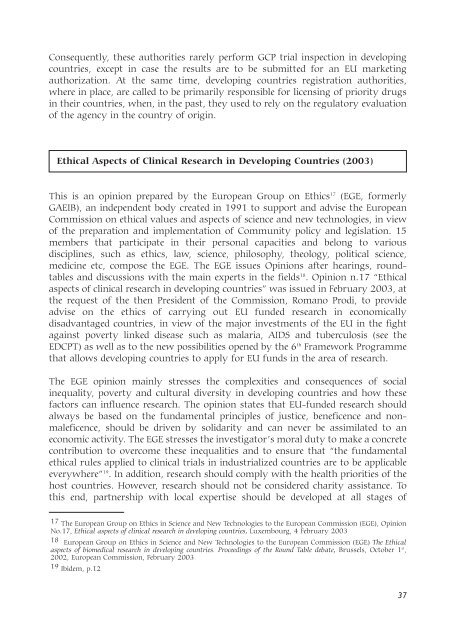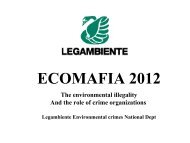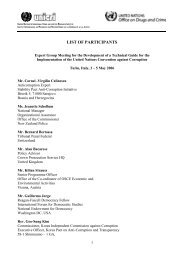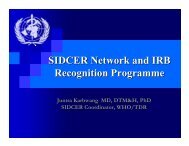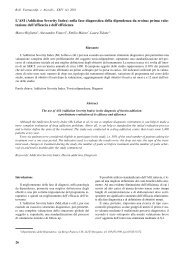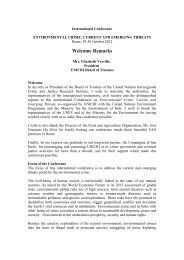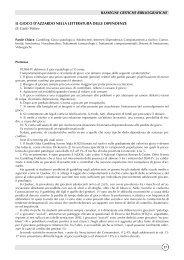Biomedical Research in Developing Countries - UNICRI
Biomedical Research in Developing Countries - UNICRI
Biomedical Research in Developing Countries - UNICRI
Create successful ePaper yourself
Turn your PDF publications into a flip-book with our unique Google optimized e-Paper software.
Consequently, these authorities rarely perform GCP trial <strong>in</strong>spection <strong>in</strong> develop<strong>in</strong>g<br />
countries, except <strong>in</strong> case the results are to be submitted for an EU market<strong>in</strong>g<br />
authorization. At the same time, develop<strong>in</strong>g countries registration authorities,<br />
where <strong>in</strong> place, are called to be primarily responsible for licens<strong>in</strong>g of priority drugs<br />
<strong>in</strong> their countries, when, <strong>in</strong> the past, they used to rely on the regulatory evaluation<br />
of the agency <strong>in</strong> the country of orig<strong>in</strong>.<br />
Ethical Aspects of Cl<strong>in</strong>ical <strong>Research</strong> <strong>in</strong> Develop<strong>in</strong>g <strong>Countries</strong> (2003)<br />
This is an op<strong>in</strong>ion prepared by the European Group on Ethics 17 (EGE, formerly<br />
GAEIB), an <strong>in</strong>dependent body created <strong>in</strong> 1991 to support and advise the European<br />
Commission on ethical values and aspects of science and new technologies, <strong>in</strong> view<br />
of the preparation and implementation of Community policy and legislation. 15<br />
members that participate <strong>in</strong> their personal capacities and belong to various<br />
discipl<strong>in</strong>es, such as ethics, law, science, philosophy, theology, political science,<br />
medic<strong>in</strong>e etc, compose the EGE. The EGE issues Op<strong>in</strong>ions after hear<strong>in</strong>gs, roundtables<br />
and discussions with the ma<strong>in</strong> experts <strong>in</strong> the fields 18 . Op<strong>in</strong>ion n.17 “Ethical<br />
aspects of cl<strong>in</strong>ical research <strong>in</strong> develop<strong>in</strong>g countries” was issued <strong>in</strong> February 2003, at<br />
the request of the then President of the Commission, Romano Prodi, to provide<br />
advise on the ethics of carry<strong>in</strong>g out EU funded research <strong>in</strong> economically<br />
disadvantaged countries, <strong>in</strong> view of the major <strong>in</strong>vestments of the EU <strong>in</strong> the fight<br />
aga<strong>in</strong>st poverty l<strong>in</strong>ked disease such as malaria, AIDS and tuberculosis (see the<br />
EDCPT) as well as to the new possibilities opened by the 6 th Framework Programme<br />
that allows develop<strong>in</strong>g countries to apply for EU funds <strong>in</strong> the area of research.<br />
The EGE op<strong>in</strong>ion ma<strong>in</strong>ly stresses the complexities and consequences of social<br />
<strong>in</strong>equality, poverty and cultural diversity <strong>in</strong> develop<strong>in</strong>g countries and how these<br />
factors can <strong>in</strong>fluence research. The op<strong>in</strong>ion states that EU-funded research should<br />
always be based on the fundamental pr<strong>in</strong>ciples of justice, beneficence and nonmaleficence,<br />
should be driven by solidarity and can never be assimilated to an<br />
economic activity. The EGE stresses the <strong>in</strong>vestigator’s moral duty to make a concrete<br />
contribution to overcome these <strong>in</strong>equalities and to ensure that “the fundamental<br />
ethical rules applied to cl<strong>in</strong>ical trials <strong>in</strong> <strong>in</strong>dustrialized countries are to be applicable<br />
everywhere” 19 . In addition, research should comply with the health priorities of the<br />
host countries. However, research should not be considered charity assistance. To<br />
this end, partnership with local expertise should be developed at all stages of<br />
17 The European Group on Ethics <strong>in</strong> Science and New Technologies to the European Commission (EGE), Op<strong>in</strong>ion<br />
No.17, Ethical aspects of cl<strong>in</strong>ical research <strong>in</strong> develop<strong>in</strong>g countries, Luxembourg, 4 February 2003<br />
18 European Group on Ethics <strong>in</strong> Science and New Technologies to the European Commission (EGE) The Ethical<br />
aspects of biomedical research <strong>in</strong> develop<strong>in</strong>g countries. Proceed<strong>in</strong>gs of the Round Table debate, Brussels, October 1 st ,<br />
2002, European Commission, February 2003<br />
19 Ibidem, p.12<br />
37


